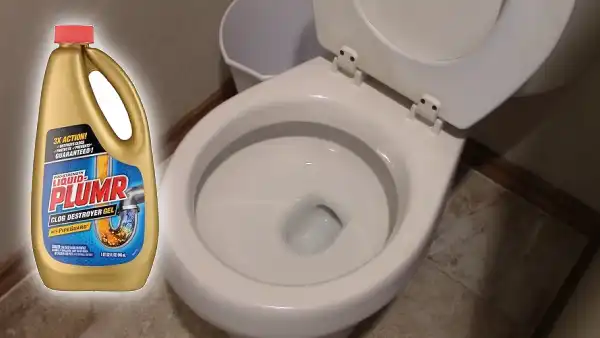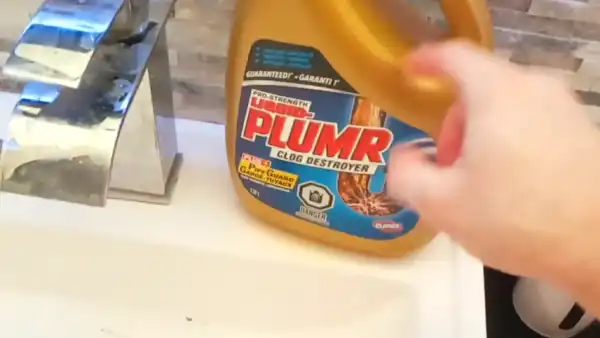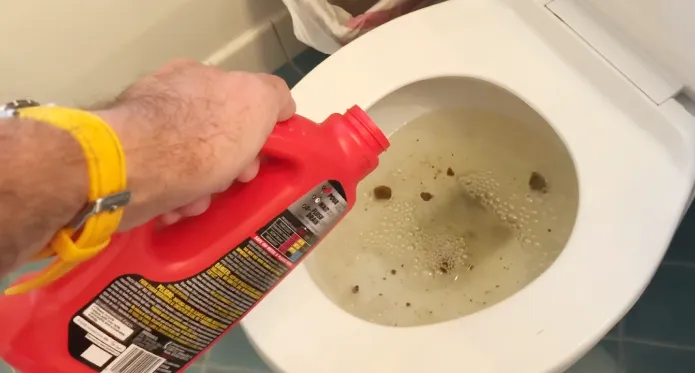Last Updated on November 14, 2023
Clogged toilets are one of the most frustrating problems a homeowner can face. While numerous products are available for unclogging toilets, many of us consider liquid plumbers such as Liquid-Plumr or similar products, but is it a wise choice for this task?
Although using liquid plumbers to unclog toilets may seem quick and easy, it won’t unclog your toilet. These cleaners contain sodium hydroxide, and bleach composition can’t dissolve waste, causing clogs. These plumbers can also damage the wax ring seal on your toilet, causing water leakage.
This article explores why you should avoid using a liquid plumber, what safe alternatives to consider, and when it’s best to seek professional help. So keep reading to find the answer to your clogged toilet woes.
Why Should You Avoid Using a Liquid Plumber to Unclog Toilets?

You must understand why you should not use a liquid plumber when unclogging toilets. The reasons are:
- Chemical reactions with other cleaners
- Ineffectiveness on toilet clogs
- Damage to wax rings
- Corrosion of metal pipes
Chemical Reactions with Other Cleaners
Using liquid plumber (also known as Liquid-Plumr) or similar products in a toilet can lead to dangerous chemical reactions with other drain cleaners.
When these two substances mix, they can create chlorine gas, which is highly toxic and poses serious health risks. Chlorine gas can cause respiratory problems and even be life-threatening if inhaled.
Generally, not all drain cleaners will react with Liquid-Plumr in this way, but certain chemicals commonly found in other cleaners can trigger the formation of chlorine gas.
Ineffectiveness on Toilet Clogs
Liquid-Plumr and similar products are designed for smaller clogs in sinks and lavatories. However, these products are largely ineffective when it comes to unclogging toilets. The larger and more voluminous clogs typically found in toilets require a different approach.
This cleaner may not have the strength or ability to break down and dissolve stubborn blockages in toilet pipes effectively. Even for smaller clogs, these products often fall short of providing satisfactory results.
You should know the limitations of liquid drain cleaners such as Liquid-Plumr and seek alternative solutions when dealing with toilet clogs. Plungers, augers, or calling a professional plumber are usually better options for tackling toilet blockages effectively.
Damage to Wax Rings
Avoid potential damage by being aware of Liquid-Plumr drain cleaner’s corrosive nature and how it can eat away at the wax ring sealing your toilet.
The wax ring plays a crucial role in preventing water leaks around the base of your toilet. When harsh chemicals in Liquid-Plumr come into contact with the wax ring, they can cause corrosion and weaken its integrity. Over time, this can lead to water leaks and potential damage to your bathroom floor and subfloor.
Corrosion of Metal Pipes
Corrosion occurs when the high pH level eats away at the metal surface, weakening it over time. When these products come into contact with metal pipes, they can cause damage and lead to leaks.
Not only does this pose a risk for potential pipe failure, but it can also result in the release of chlorine gas, which is hazardous and can also corrode nearby metal surfaces.
Safe Alternatives to Liquid Plumber to Unclog Toilets
There are a few key options when looking for safe alternatives to liquid plumbing for unclogging toilets.
Natural Bacteria and Enzyme Cleaners
Using natural bacteria and enzyme cleaners can effectively break down clogs in toilets without causing harm to your plumbing. These products introduce beneficial bacteria and enzymes into the clogged pipes, which feed on the organic matter causing the blockage.
The bacteria produce enzymes that break down the waste material, allowing it to be easily flushed away. Unlike harsh chemical drain cleaners, natural bacteria, and enzyme cleaners are safe for all plumbing systems, including septic tanks.
They are also environmentally friendly, as they do not contain harmful chemicals that can pollute water sources or damage pipes over time. Despite taking longer to work, these cleaners offer a gentle yet effective solution to unclogging toilets.
Baking Soda and Vinegar
If you’re looking for a homemade solution to unclog your toilet, baking soda and vinegar can be an effective option. This method creates a chemical reaction that breaks down the clog.
Mix 1 cup of baking soda into 2 cups of vinegar in a bowl to use this solution. Once the mixture is ready, pour it into the toilet bowl and let it stand for a few minutes. During this time, the reaction will start to dissolve the clog.
After waiting, simply flush the toilet and see if the clog has cleared. This method best suits minor clogs and may not work as effectively on more stubborn blockages.
When should you not use a liquid plumber?
Liquid drain cleaners like Liquid-Plumr or equivalent products can cause damage to your entire home’s plumbing system if used in excessively standing toilet water or clogged showers. This is because its leftover chemicals eat away at the finish of sinks and toilets.
If you have a completely clogged toilet, using a liquid drain cleaner may not be effective. The standing water in the toilet bowl will dilute the chemicals and reduce their effectiveness.
If you suspect a serious problem with your plumbing system, it is best to call a professional plumber instead of attempting to unclog it yourself with a liquid drain cleaner. They will ensure that the problem is properly diagnosed and resolved without causing further damage to your plumbing system.
Is it better to leave the liquid plumber overnight?
It’s recommended to let Liquid-Plumr sit overnight if you have an especially slow drain. Allowing it to sit overnight gives the active ingredients in Liquid-Plumr more time to dissolve hair, grease, and other debris that may be causing the slow drain.
However, do not overuse this type of cleaner or use other cleaners simultaneously with Liquid-Plumr. Overusing these products can damage your pipe’s fixing and potentially lead to costly repairs.
Do plumbers recommend liquid plumbers?

Plumbers often advise against using liquid drain cleaners. These products may seem convenient but can do more harm than good. Liquid plumber contains harsh chemicals that can corrode pipes over time, leading to costly repairs. Besides not removing clogs, these cleaners can leave a residue that worsens things.
Instead, it is recommended to call a professional plumber. They have the expertise and proper tools to safely and effectively unclog drains. They can assess the situation accurately and provide a reliable solution that won’t cause further damage to the plumbing system.
Avoid the Temptation: Do Not Use a Liquid Plumber for Toilet Clogs
While using Liquid Plumber or Liquid-Plumr for toilet clogs may be tempting, these products should be avoided at all costs. The harsh chemicals used in these cleaners can pose a significant risk to your health, plumbing, and property.
They are ineffective for handling larger toilet clogs and can also cause severe damage to your toilet’s base and stainless steel pipes. When confronted with a clogged toilet, opting for safer, natural, and more effective alternatives, such as bacterial enzyme cleaners, baking soda, or vinegar, is best.
By taking precautions and choosing reliable products, you can solve your toilet clogging problems without jeopardizing your health or your property.

